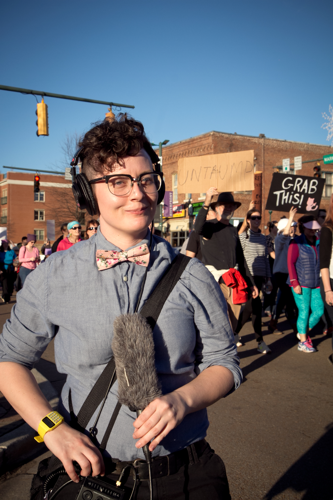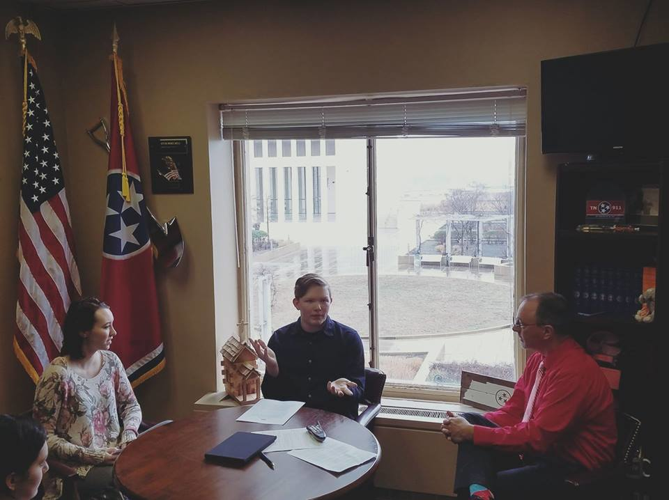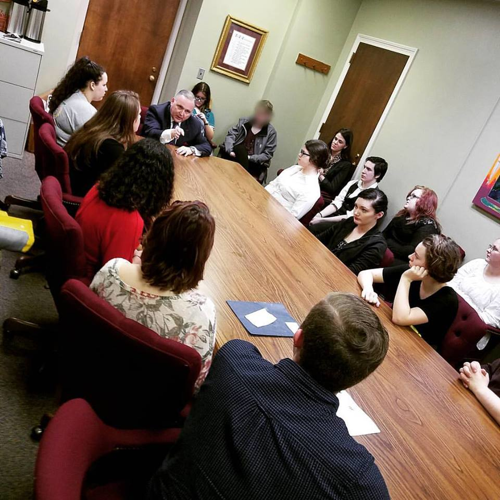
Jacqui Helbert, on assignment earlier this year for WUTC.
Early in the morning of March 7, Jacqui Helbert boarded a bus in Bradley County to head to Nashville.
The 32-year-old reporter had been at the University of Tennessee at Chattanooga’s public radio station, WUTC-FM, part-time for six months, her first ever journalism job after a career-and-life-changing experience at the nine-week Transom Story Workshop, a radio training program on Cape Cod. Now it would be Helbert’s first time to visit the Capitol.
Helbert came up with the idea for the story in January — she'd travel with the newly formed Gay-Straight Alliance at Cleveland High School as they attended the Tennessee Equality Project's Day on the Hill and met with their local lawmakers to express concerns over anti-LGBTQ legislation. She was nervous as she rolled into Nashville, but the high schoolers were so tough, so passionate, that she said to herself, “If they can do it, I can do it.”
They went first to the office of state Sen. Mike Bell, (R-Riceville). Helbert had been wearing her radio gear all morning already, getting audio on the bus. She had a long shotgun microphone, headphones and digital recorder strung across her chest. She carried a WUTC-emblazoned tote bag and wore a lanyard with press credentials. She shook Bell’s hand, having to move her radio equipment out of the way to do so. And then she stood by the front row of chairs in Bell’s office, directly across from him, as high school students grilled him on the anti-transgender bathroom bill.
But here’s the thing — Bell says he has no idea he was being recorded, because Helbert did not specifically announce herself as a reporter. Rep. Kevin Brooks (R-Cleveland), with whom the kids met with a few hours later, says the same thing. And so Bell complained to Sen. Todd Gardenhire, because UTC is in his district. And Gardenhire complained to UTC’s chancellor’s office. And now Helbert doesn’t have a job.

Kat McKay and Patrick Pyott meeting with Sen. Mike Bell on March 7.
Neither Bell or Gardenhire would comment for this story, despite repeated calls, emails and texts over three days. Sen. Bo Watson (R-Hixson), who was reportedly also involved, wouldn’t respond to calls either; his legislative assistant said he was “too busy” on Friday to talk. Rep. Patsy Hazlewood (R-Signal Mountain), who was present at one meeting with legislators and the chancellor’s staff, also wouldn’t return calls.
The timeline the Scene has developed is based on interviews with Helbert, students on the trip, UTC officials, and a collection of documents provided by Helbert — emails, text messages and recordings and transcripts of meetings she had with her supervisors at the radio station. And what those documents show is that UTC is definitely not telling the full truth about why they say they fired Helbert.
Helbert was fired this past Tuesday, for what senior associate vice chancellor of marketing and communications George Heddleston says was a breach of journalistic ethics — she didn’t introduce herself as a journalist before recording Bell and Brooks.
“This story is not about the bathroom bill, this story is only about journalistic ethics — we investigated as carefully as we could,” Heddleston says. “We had no problem with the story she did.”
However, the story Helbert wrote and recorded after her trip to Nashville is no longer on WUTC’s website. Heddleston says it was removed “because her journalistic ethics caused us a problem, and I told the news director to take it down.”
In that story, which aired March 9 and remains archived elsewhere, Bell makes several students cry after he tells them that transgender people are basically not a thing.
“Is it how I feel on Monday? I feel different on Tuesday? Wednesday I might feel like a dog,” Bell says.
Two students, Kat McKay and Patrick Pyott, question Bell about the fake news and fake science he cites. He says “it’s all hogwash” and cuts the meeting short.
Next the students visit Brooks, who is more sympathetic. He tells them the bathroom bill probably won’t make it out of committee — which it did not, dying in the Senate earlier this week — and says he probably won’t support it if it does, commenting, “It seems to be a divisive solution, in search of a problem.”
During the visit with Brooks, according to McKay and Pyott, Helbert was in the back of the room, and she didn’t shake his hand — no one did. But both say that even across the room, she was directly across from Brooks, and they can’t understand how he didn’t notice her microphone.
“He had to have clearly seen her,” Pyott states.
“She had her recorder on her hip and she kept looking down and that and adjusting [the recording levels] throughout the meeting — it was very noticeable,” McKay adds.
But Brooks swears he never noticed Helbert, or anyone that looked a decade older than the high schoolers.
“It was a very personal and candid discussion, and I never would have shared some of the things I did if I thought it was going to be used for broadcast,” Brooks says. “I have no recollection of anyone who looked like they were recording anything.”

Cleveland High School GSA students meet with Rep. Kevin Brooks.
However, Brooks didn’t complain about the story, either to the radio station or the UTC administration. He did talk about it to Bell, apparently worried that his comments not supporting the bathroom bill would be misconstrued by his constituents as supporting LGBTQ rights in general — he doesn’t. Another part of Brooks’ conversation with the students about the “Natural Marriage Defense Act,” an anti-gay marriage bill, made it clear he’s not exactly a proponent of gay marriage.
But Bell did call the station to complain. He also complained to Gardenhire.
Helbert found out Bell had complained on March 13. That afternoon, her supervisor, news director Mike Miller, texted her to ask if Bell knew she was a journalist.
“I have no idea,” Helbert replies. “I shook his hand. Told him my name. With my gear out and on. I’ve never told anyone I’m a journalist recording for a radio story. It is implied by the gear, credentials, mic pointed at them, etc.”
This is, of course, not best journalistic practice.
“Even though she had a microphone clearly visible, it’s clearly an ethical violation,” says Thom Storey, a Belmont University professor of journalism. “That’s one of the things that I stress in my classes — always make it very clear who you are and what you are there for.”
However, Helbert had never taken a journalism class, per se. The Transom workshop focuses more on the ins and outs of radio production and narrative storytelling — the kind of pieces you might hear on This American Life, for example. As a nervous, beginning journalist, Helbert really had no idea she had done anything wrong by not telling Bell and Brooks who she was.
Later on March 13, after the texts, Miller emailed Helbert.
“We still need to get people’s verbal consent before interviewing them, and they need to be explicitly told they’re being recorded for radio,” Miller writes. “We must always do that. Interview subjects should never be surprised to find their voices in a radio story, and we can’t assume that our mics or our badges are sufficient notice. We need to identify ourselves by name, media outlet & purpose & get verbal consent before recording. … You’re doing a great job, and I’m not criticizing you. This is simply a matter of basic ethics & policy.”
Miller includes a link to the NPR code of ethics for Helbert’s reference, which she says is the first time she had ever seen it or read it.
But on March 15, the chancellor’s office had sent Miller a list of questions about reporting procedures and protocol at the station. In a separate email that day, Miller emails Helbert and another staff member about the situation.
“I’ve heard all this second hand, so the details may be incomplete. Regarding the questions about your story—apparently local lawmakers friendly with Brooks contacted the UTC Chancellor, saying Brooks is unhappy about the story. The assumption being, Brooks didn’t want the general public to hear what he said to the students, perhaps worried that he’ll lose voter support if he’s viewed as gay-friendly,” Miller writes. “The situation is no small matter because lawmakers are meeting with UTC officials very soon to talk about funding — UTC gets state funds, of course, and lawmakers like Brooks and his colleagues may be able to cut funding, or might threaten to, if something UTC-relate[d] has raised their ire.”
Miller goes on to note that UTC officials could be worried about a similar situation arising as happened at the University of Tennessee at Knoxville last year, when the diversity office was completely defunded after being perceived as too “politically correct.” WUTC receives about $500,000 in annual funding from the university, along with office space on campus — the rest of its budget comes from donations and underwriting, like most public radio stations throughout the country.
Miller also notes that the university isn’t yet used to WUTC actually covering hard news, something that’s only happened at the station in the past year and a half or so.
“Under the previous station manager, we were relegated to doing nothing but fluffy feel-good stories for exactly this reason: the manager feared raising anyone’s ire,” Miller adds.
Helbert met with Miller and other staff members during the next two days to discuss the situation and answer the administration’s list of questions, which they wanted by noon on March 17. It’s clear in the transcripts of these meetings that the staff is very worried about funding being threatened by the legislators involved and political pressure exerted.
However, according to Heddleston and Terry Denniston, the chief of staff in the chancellor's office, no funding was ever threatened.
“That did not happen,” Heddleston says,
“That’s totally incorrect,” Denniston says. “None of the senators did that.”
Denniston says university staff met with the Chattanooga legislative delegation — Gardenhire, Watson and Hazlewood — on March 17 in their regular once-a-semester meeting. Most of the discussion revolved around a new teacher preparation program and research grants. It was only after the formal meeting, Denniston says, that the topic of Helbert’s story first came up.
“The meeting ended and Senators Gardenhire and Watson stayed on, and they brought the issue up about her journalistic ethics,” Denniston says, adding that at no time did they threaten to pull funding from the station or the university.
“At the end of the meeting funding for the station came up — it was just mentioned, that’s all,” Denniston says.
However, after that meeting WUTC staff member Mary Ollie Newman told Miller and Helbert that funding was at risk, according a recording of a meeting provided by Helbert.
“They are not pleased up there,” Newman says. “[Denniston] is trying her best to deflect and make this — but it is serious. The chancellor wasn’t here today. So, I don’t think he knows any of this yet. But these fellas are just unbelievable.”
“It seems highly unethical that they are threatening, you know, threatening to hold funding from the University for —“ Helbert replies.
“Do not repeat that,” Newman says.
“No no no no,” adds Dawn McFadden, another staff member.
“To anybody,” says Newman.
“No, that’s confidential information,” says McFadden.
But Denniston says Newman must have misunderstood what she told her.
“If she interpreted that as a threat, that’s incorrect,” Denniston says.
Yet even if no funding was ever at risk, UTC’s timeline provided to the Scene is still off — it’s clear the administration had been contacted days before the March 17 meeting, and it seems they wanted the list of questions about station protocol to be able to share with the legislators for that meeting.
UTC also seems determined to damage Helbert’s credibility as much as possible. When the Scene first spoke with Heddleston on Thursday, he said Helbert was fired for not disclosing she was a journalist. When he called again on Friday, he said Helbert had also “edited comments from Books that seemed to fit her story” — i.e., had cut and spliced the tape to make Brooks say something he hadn’t said, an incredibly serious journalistic transgression.
But the audio and the transcript of the audio provided by Helbert of the students’ meeting with Brooks shows no such thing — his remarks were edited for length, a necessity in the radio world, but not taken remotely out of context. And in Heddleston’s meeting with Helbert to fire her, he mentions no such infraction, nor does her letter of dismissal. (She provided a recording of that meeting too.) In fact, the first Helbert had heard of that complaint was when asked about it by the Scene.
“That’s insane!” Helbert says. “I did make it shorter, but that’s normal. And it went through multiple edits with my boss and my boss’s boss, to make sure it was fair.”
Heddleston also refused to say to whom the administration talked when conducting its investigation prior to firing Helbert and as to whether anyone other than Bell and Brooks was contacted. But he did admit that UTC did not contact a single one of the 18 students on the trip, nor the two teachers supervising. Multiple students sent emails detailing Helbert’s prominent radio equipment; it’s unclear whether the administration read them.
Helbert screwed up, and she admits that. But she also feels confident that’s not the reason she was fired.
“It’s total blackmail. And it’s a complete conflict of interest,” Helbert says.
Storey concurs.
“It seems awfully drastic, that this would be severe enough to warrant a dismissal,” Storey says. “Being in the position those [legislators] are in — most would question why they’re getting involved. Does there seem to be some ulterior motive behind the firing? I’d say yes.”
Miller would not comment as to whether the firing was agreed upon by the station or determined by the chancellor's office.
"I was not aware that Helbert had not verbally identified herself as a WUTC reporter, or that the subjects were unaware a story was being filed. Had I known that, I would have required us to contact the legislators involved to allow for their feedback and comment before we ran the story," Miller emails. "If the lawmakers quoted in the story feel their statements were taken out of context or didn’t fully explain their positions on the bathroom bill, I would be happy to follow up with them and issue a correction or follow-up story. As the news director, I want to ensure everything we air is accurate, complete, and created with the explicit consent of anyone interviewed."







